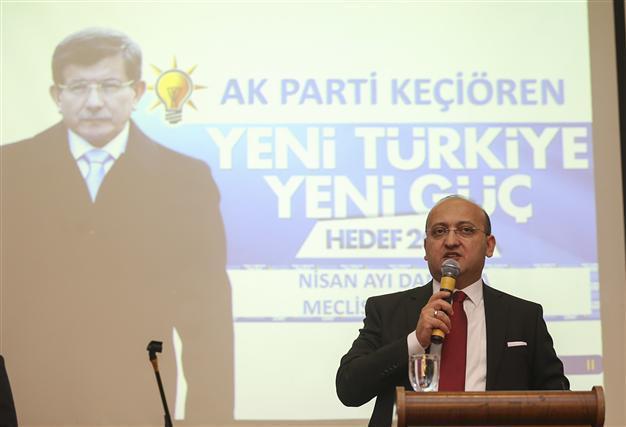Turkish Deputy PM: Demirtaş under PKK ‘tutelage’
ANKARA

AA Photo
Turkish Deputy Prime Minister Yalçın Akdoğan has said Peoples’ Democratic Party’s (HDP) Co-Chair Selahattin Demirtaş is under the direct “tutelage” of Cemil Bayık, a senior leader of the outlawed Kurdistan Workers’ Party (PKK).“Selahattin Demirtaş delivers fancy remarks but there is a Cemil Bayık in him. That is, he is acting under Cemil Bayık’s tutelage. The HDP has been able to move certain places by his [Bayık’s] instructions, statements and routes,” Akdoğan said.
The government-led Kurdish peace process, which aims to end the three-decade long conflict between Turkey’s security forces and the PKK, has not been suspended, Akdoğan said on April 22. ”The HDP should make an open call to the PKK to lay down their arms, in order to display that it favors a disarmament solution.”
In a live interview, Akdoğan continued, “Let’s further strengthen it [democratic politics], hand-in-hand…we are able to speak and say everything in parliament too. Can he [Demirtaş] say ‘We don’t accept a method that ends people’s lives and the PKK should stop this?’ No, he cannot.”
Bayık, co-chair of the Kurdistan Communities Union (KCK), a supra organization that includes the PKK, is based at the PKK headquarters in the Kandil Mountains of northern Iraq.
Akdoğan said even with a resolution to the Kurdish issue, the fight would continue “against this Marxist-Leninist ideology and mentality, which seeks to be the CHP [the main opposition social democrat Republican People’s Party] of the Kurds and which, in no way, abandons arms…because we cannot leave the Kurds in their [the HDP’s] captivity.”
As a key figure involved in the peace process, Akdoğan has frequently criticized the HDP, a stakeholder in the process. His latest remarks came a day after the HDP vowed to be President Recep Tayyip Erdoğan’s “nightmare,” by blocking his plans for an executive presidency if it enters parliament.
Erdoğan, sometimes dubbed a “sultan” by critics who accuse him of increasing authoritarianism, said previously it would be a “nightmare” if Turkey’s June 7 election parliamentary election resulted in a coalition government.
The ruling Justice and Development Party (AKP), founded by Erdoğan, needs to win a two-thirds majority to introduce a new constitution centered on a strong executive presidency.
This goal will become much harder if the HDP clears the 10 percent parliamentary threshold. With 10 percent, the HDP could win up to 60 seats in Turkey’s 550-member parliament. If the HDP misses the threshold, the AKP could end up with around 30 additional seats.
The HDP’s failure to enter parliament could also endanger the peace process initiated by Erdoğan in 2012 and in which jailed PKK leader Abdullah Öcalan plays a central role.
















